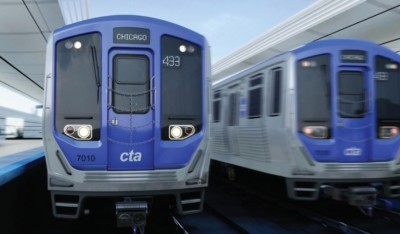Greg Hinz | Crain’s Chicago Business
CSR Sifang’s bid was $226 million below that of a division of Bombardier, a Canadian firm that is the builder of the newest group of CTA cars. Parent company CSR America is owned by the Chinese government, but CTA officials stressed that the bid includes a significant “Made in America” component.
According to CTA spokesman Brian Steele, not only will the cars be assembled at a Far South Side plant but CSR has promised that at least 69 percent of all components will be made in the U.S. The operation will employ about 160 workers.

The bids came in somewhat lower than earlier estimates of up to $2 billion, though an escalator clause could push the deal’s value as high as $4 billion.
The first cars—prototypes—are scheduled for delivery to the CTA in 2019. Unless there is a delay, the base order of more than 400 cars will arrive by 2024, with more cars thereafter.
The competition for the contracts, one of the largest in city history, has been fierce, with both sides retaining politically connected lobbyists and consultants.
As I previously reported, Mayor Rahm Emanuel privately hoped for the Chinese firm to win because he is seeking Chinese investment capital for his proposed multimillion-dollar express train from the Loop to O’Hare International Airport. He’s also repeatedly talked about the $1 billion or so a Chinese firm is preparing to drop in building the Jeanne Gang-designed Wanda tower on East Wacker Drive.
Emanuel was in China in 2013, and Deputy Mayor Steve Koch led a delegation there last summer before Emanuel returned in November.
In fact, Chicago is a bit like China: The political powers have their fingers in all kinds of deals, public and private, and never forget anything.
Update, 1:40 p.m. — Bombardier is declining comment, though a company representative at the CTA board meeting sure looked unhappy and was unable to speak to the board before it voted. CSR also is not yet talking.
But Mayor Rahm Emanuel showed up an hour or so after the vote to run a victory lap and, in this case, it may be deserved.
Emanuel noted that it’s been 35 years since the last rail car rolled off a Chicago assembly line, in Pullman, just north of where the CSR plant will go.
“It’s one thing to acquire cars that will give riders a modern experience. It’s another to bring back manufacturing of rail cars to Chicago,” said Emanuel. The new deal “will go down in history.”
The assemble-here offer was made after CTA officials included in bid documents a request for any bidder to say how much of their work would be performed in the U.S. Inserting that clause was Emanuel’s idea, I’m told by good sources, and CSR was smart enough to pick up on the big hint.
CTA officials could not immediately answer why CSR’s bid came in so much lower than Bombardier’s. But they said that when the new cars are delivered, the agency will have the youngest fleet in the country, averaging 15 years of age. That should save on maintenance costs.
The CTA is getting a low-interest federal TIFIA (Transportation Infrastructure Financing and Innovation Act) loan to pay for the cars, and will also use other funds.
And, for the record, Emanuel stopped well short of denying those rumors that awarding the pact to CSR is linked to the city’s quest for Chinese investment cash for other deals.
“I don’t know about that,” Emanuel said, with a smile, adding, “We want to bring these investments to the city of Chicago.”
One other addition: the folks at the Chicago Federation of Labor have been working on such a factory for a while and say they’re the ones who put the idea in Emanuel’s ear to link the new contract with the local assembly plant.
source: Crain’s Chicago Business